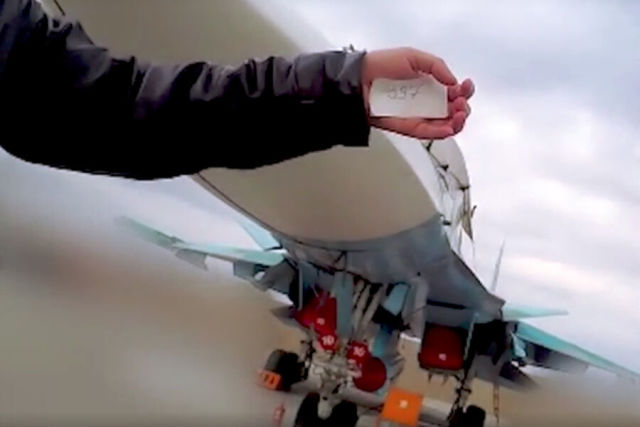The FSB said it had prevented the hijacking of Russian military aircraft by the special services of Ukraine
The Federal Security Service of Russia stated that they had stopped the operation of the Ministry of Defense of Ukraine to hijack Russian Air Force combat aircraft - Su-24M, Su-34 and Tu-22M3. According to the agency, the actions of Ukrainians were supervised by NATO special services.
"They tried to recruit Russian pilots"
As noted According to the FSB website, Ukrainian military intelligence officers, "acting on behalf of the political leadership of their country, tried to recruit Russian military pilots for monetary remuneration and guarantees of obtaining citizenship of one of the EU countries."
"(They tried. - "Newspaper.En") to persuade them to fly and land aircraft at airfields controlled by the Armed Forces of Ukraine," the report says.
The Russian ministry added that "during the operational game," counterintelligence agents received information that helped the Armed Forces "inflict fire damage on a number of Ukrainian military facilities."
In addition, the FSB said that the employees of the Ukrainian special services involved in the operation and their accomplices have already been identified.
According to TASS, with reference to FSB videos, Ukrainian military intelligence was ready to pay pilots up to $ 2 million for the hijacked aircraft of the Russian Aerospace Forces. According to the Russian ministry, the Ukrainian military had to simulate the interception of the hijacked aircraft. They were interested in the Russian Su-24M, Su-34 and Tu-22M3.
Allegedly, in exchange for planes, Ukrainian intelligence promised to transfer the wives of the Russian military to the European Union - Germany, Bulgaria, the Baltic states - and open currency accounts there.
"As follows from the above fragments of correspondence between Ukrainian intelligence officers and Russian pilots in messengers, for the willingness to hijack a plane, the GUR would have paid 4 thousand dollars in advance, which would have been transferred by couriers, and then promised to pay another two million dollars," RIA Novosti reports with reference to FSB data.
"Clonidine poisoning"
An operative of the FSB of Russia told the Rossiya 24 TV channel that Ukrainian intelligence also planned to take hostage the family of a Russian military pilot who would hijack a plane to Ukraine.
"As soon as the family members of the Russian pilot leave Russia, they immediately become hostages in the hands of the GUR. Methods of blackmail, threats, and pressure on relatives have become an integral part of the activities of the Ukrainian special services. There are no moral and moral restrictions for them. They would just kidnap them," the FSB officer said.
And the navigator of the Russian combat aircraft, which the Ukrainian military tried to hijack, allegedly planned to poison with clonidine. The TV channel published a fragment of a telephone conversation between a "Ukrainian officer and a Russian pilot" who allegedly agreed to the hijacking.
The Ukrainian serviceman asked the pilot if the navigator of the plane drinks coffee. He also offered to transfer the drug, which will take effect "in 30-40 minutes." Then "Russia 24" shows footage with two packages of clonidine seized in a hiding place in Volgograd, 10 ampoules each - allegedly the same drug that the Ukrainian officer was talking about.
"It is obvious that the operation itself was carried out with the support of Western, primarily British special services," the FSB officer said.
The TV channel also showed four thousand dollars, which were allegedly seized from a Ukrainian courier. The money, according to the FSB, was intended for a Russian pilot who agreed to the hijacking.
"I took it as a joke"
Rossiya 24 also aired a Russian military pilot who helped the FSB thwart Ukraine's plans to hijack planes. He said that he was contacted by "a man who offered to hijack aviation equipment to the territory of Ukraine for a certain amount."
"Initially, I took the information received from an unknown person as a joke, of course. However, after further communication, it became clear that I was dealing with representatives of the special services of Ukraine and their Western allies. By these actions, in their opinion, I had to show my negative attitude to the policy of the country's leadership on conducting a special operation," the pilot said.
He added that Ukrainian intelligence offered him passports of European states, promised a comfortable life abroad.
From the video materials released by the FSB, it also follows that during the preparation of the hijacking of aircraft, Ukrainian intelligence itself revealed to Russia the locations of air defense systems and airfields of Ukraine. This information was allegedly passed to the pilot, who pretended that he agreed to the hijacking.
Among the data are the air defense zones in the south-east of Ukraine, the schemes of the airfields of Ozernoye (Chernihiv region) and Starokonstantinov (Khmelnytskyi region), a map of the heights of the vicinity of the Priluki airfield (Chernihiv region) and a map of the heights of the vicinity of Zhytomyr. It was also established where the largest number of portable anti-aircraft missile systems are concentrated in the settlements of Ukraine.
According to Rossiya 24, a fragment of the correspondence of the chief investigator of the Bellingcat publication (The publication is recognized in Russia as a foreign media agent and included in the list of undesirable organizations) Hristo Grozev, who allegedly participated in the operation of Ukrainian military intelligence, was also shown.
The TV channel's story says that through his coordinator, Grozev found two courier girls who met at the railway station in Lipetsk a courier hired by Ukrainian intelligence officers from Moscow, who was carrying an advance of $ 4,000 for allegedly agreeing to hijack a Russian pilot.
"We know about Grozev's involvement in MI6 not only from his statements Recently, Ukrainian intelligence has stopped hiding its ties with the special services of NATO countries," an FSB officer said on the TV channel.
Maria Shustrova

